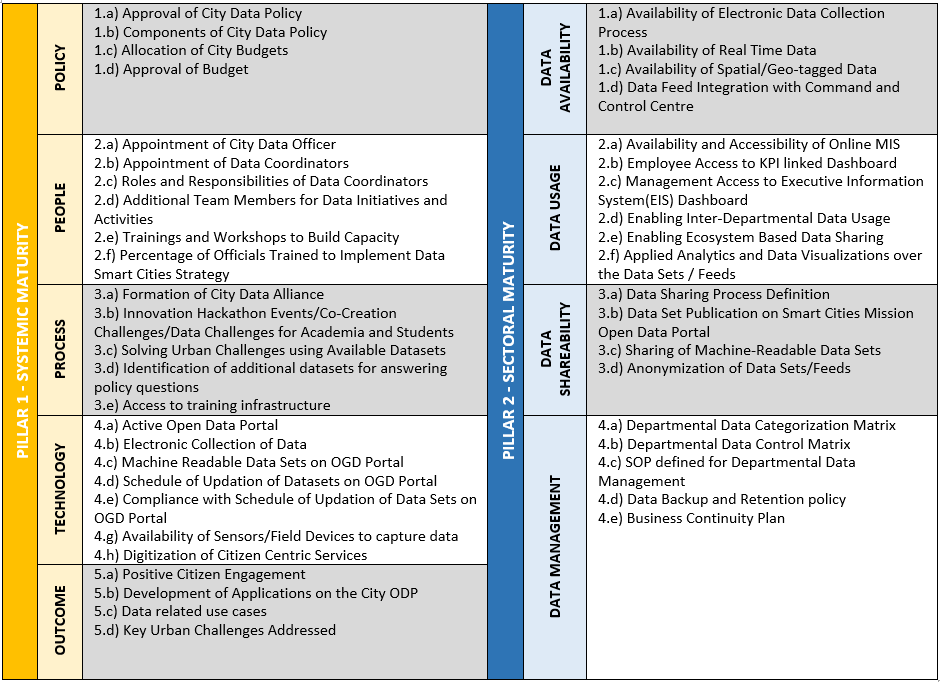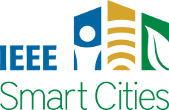Exploring Open Data Journey of Indian Smart Cities
Written by Gayatri Doctor, Poornima Dore, and Irene Anna Shaji
This article analyses the Indian Smart Cities' open data digital transformation journey. Data by itself has no purpose; it is a resource that needs to be leveraged. India’s urban population has risen from 6.2% (in 1951) to 31.2% (in 2011), 34.93% live in urban areas as of 2020, and projections indicate it might touch 40% by 2031 [1]. The Indian cities are undergoing rapid urbanization and have limited resources at their disposal. This requires developing a truly effective system of governance with the use of high-quality, timely, and granular data. Data-driven governance can assist in driving informed decisions, set implementation goals, and also helps increase transparency and accountability. India visioned an ambitious plan to make 100 Smart Cities and introduced initiatives, like the Data Smart Cities Strategy (DSC) [2], the Smart Cities Open Data Portal [3], the Data Maturity Assessment Framework (DMAF) [4], the City Data Policy (CDP) [5], and the City Data Officer (CDO) [6].
Introduction
Open Government Data (OGD) is a philosophy and increasingly a set of policies that encourages transparency, accountability and value creation by making government data accessible and available to all. OGD has a progressive stratum. It has made great strides in recent years and can make far more in the coming years. Open Data has been acknowledged worldwide as the key enabler for achieving the UN Sustainable Goals [7]. India has made significant progress in open data and accessibility in the last few years, compared to the previous decades. Across India, all states have attempted to make government data classified as public data (those which are not sensitive in nature, and available for public consumption and use) more accessible to all stakeholders. Pune, for example, created an open government data platform in 2016. The portal aimed to increase performance by analyzing data; engage citizens in the government's process; expand the availability of apps and data to accelerate economic development. With the data collected from the portal, a dashboard with visualizations of various city services such as solid waste management, property tax, water, health, etc., was created to help drive informed decisions [8].
There are many areas still lacking awareness and understanding of OGD, and technology limitations in accessing platforms exist, but the Indian Smart Cities Mission under the Ministry of Housing and Urban Affairs (MoHUA) vision’s to make all 100 Smart Cities; Data Smart. In 2015, the Smart Cities Mission (SCM) was launched in India. The objective of the mission was to promote liveability, economic-ability and sustainability in cities with application of ‘smart solutions’ [9]. Under the mission, 100 Smart Cities were selected in India.
The mission has led to the development of an open data portal, smartcities.data.gov.in, where all the 100 Smart Cities can share their datasets in one common platform [2]. As of September 2021, the portal has classified the catalogue into 25 sectors, and provides 75 templates (as a format for standardization, to be used by cities). The portal allows the cities to exchange valuable data, which can then be used by all involved in the smart city ecosystem. The foundation pillars of Data Smart Cities are People, Process and Platform [3]. They are envisioned to support the creation of an open data culture, leading to greater data exchange for open innovation and co-creation. As of September 2021, there are 3,203 catalogs, 3,827 resources and 242 APIs available on the Smart Cities Open Data Portal with 443,776 views and 82,097 downloads (Refer Figure 1). These are datasets which do not fall under the negative list e.g. the datasets which are confidential in nature and are in the interest of the country‘s security. It does not impose ‘Terms of Service’, attribution requirements, restrictions on dissemination and so on, which act as barriers to public use of data. Also, it does not impose cost on the public for access of datasets, as imposing fees for access skews the pool of who is willing (or able) to access information [10]. The data on the platform are in machine readable or in specified open data format only: CSV (Comma separated Values), XLS (spread sheet- Excel), ODS (Open Document Formats for Spreadsheets), XML (Extensive Markup Language), RDF (Resources Description Framework), KML (Keyhole Markup Language used for Maps), GML (Geography Markup Language), RSS/ATOM (Fast changing data e.g. hourly/daily), etc. As an example of how collected data was used, Rourkela Smart City linked the air quality dataset with transport and environment department datasets in order to promote the use of bicycles and public transportation, and to plant more trees in the city [11].

Figure 1: Indian Smart Cities Open Data Portal (Source: Website - smartcities.data.gov.in, Government of India)
Status of Open Data Journey in Indian Cities
The City Data for India initiative by TATA Trusts, in association with the World Council on City Data (WCCD) and Pricewaterhouse Coopers (PwC) India, started in 2016 [12]. Eight Indian cities were part of the WCCD ISO 37120 assessment to assess data quality, and out of these, three achieved the highest certification. TATA Trusts appointed India's first City Data Officer (CDO) for Pune Smart City in 2017 as a pilot project to understand how it can foster data culture. The CDO is a city administration role that looks into the management and optimization of city services [6]. Based on the effectiveness achieved from pilot studies, to assess and maintain the quality of data, focus was to lay the foundation in all 100 Smart Cities [13].
The individual Smart Cities are presently trying to develop their own respective CDP. It provides conceptual clarity over accessing and sharing city data. The absence of a CDP can hinder setting up a data economy in cities [5]. CDP provides clarity around ownership of data, legal framework, terms of use, etc. Some components included in CDP are data categorization, data security and privacy, data classification, and Standard Operating Procedure (SOP) for data collection, data analysis, engaging stakeholders, data processing and cleaning, data cleaning, etc. Data policies should fundamentally be motivated by the awareness and conviction about the value that data-driven decisions can add to both the public and private realm, instead of just being a formality under public and global pressure. The policies help to avoid disagreements over transparency and situations where data is available but meaningless because of inaccessibility to derive insights.
The DMAF was introduced in 2019 as a tool to measure how efficiently Indian Smart Cities manage their data [4]. The framework assessments are planned over a 10-year cycle period and is mainly divided into two parts: systematic maturity assessment and sectoral maturity assessment (refer Table 1), so far two cycles have been completed. Systematic maturity assesses five parameters: policy, people, process, technology and outcome. In sectoral maturity, it assesses four parameters: data availability, data usage, data shareability and data management. By the end of 2019, all 100 Smart Cities successfully appointed a CDO officer in their respective cities, to improve data culture and ensure the quality of data collection. TATA Trusts in 2020, in partnership with MoHUA, is promoting capacity building by providing training to the CDOs. Hence, at present the focus is to provide technical assistance and build organizational capacity, thus making stakeholders aware of the opportunities data can offer to attain transformation.
Table 1 Data Maturity Assessment Framework - Systematic Maturity and Sectoral Maturity pillars categories (Source: Data Maturity Assessment Framework – Design and Methodology document, Government of India)
Conclusion
Indian Smart Cities are at an early stage of their open data digital journey, with only two years since its implementation. Despite the challenges, (such as incomplete datasets, lack of granularity, unlinked datasets, and the lack of a self-visualization dashboard) some cities are trying to use the quality data they generate for decision making. So at present, the focus is to sensitize all the cities on the actual potential of data so that balanced growth can be seen across all cities, eliminating gaps. This can be achieved by enhancing organizational capabilities through training, assessments, and policies, to lay a foundation to support the journey towards data-driven decision-making.
References:
- S. Ravi, A. Tomer, A. Bhatia and J. Kane, "Building Smart Cities in India - Allahabad, Ajmer, And Visakhapatnam," 08 2016. [Online]. Available:
https://www.brookings.edu/wp-content/uploads/2016/08/metro_20160818_indiasmartcitiesreport.pdf. [Accessed 20 March 2021].
-
Government of India, "DataSmart Cities - Empowering Cities Through Data," 2020. [Online]. Available: https://smartnet.niua.org/dsc/pdf/DataSmart_Cities_Strategy.pdf. [Accessed 19 January 2021].
- Government of India, "Open Data Platform - Indian Smart cities," 2019. [Online]. Available: https://smartcities.data.gov.in/. [Accessed 9 January 2021].
- Government of India, "Data Maturity Assessment Framework - Cycle 2," National Institute of Urban Affairs; MoHUA, 2020. [Online]. Available: http://dmaf.mohua.gov.in/. [Accessed 05 March 2021].
- Government of India, "Designing a City Data Policy - A Reference Guide," 2020. [Online]. Available: https://smartcities.data.gov.in/sites/default/files/SCMCityDataPolicy_Guidance_Nov2020.pdf. [Accessed 20 March 2021].
- P. Dore, S. Parija and S. Swani, "India’s First City Data Officer - Recounting our Learnings & Experiences from Pune - Case Study 1," Urban Caselet Series. Tata Trusts, 07 2019. [Online]. Available: https://www.tatatrusts.org/upload/pdf/case-1-pune-city-data-officer.pdf. [Accessed 30 January 2021].
- United Nations, "Open Data - Open Opportunities," [Online]. Available: https://www.rs.undp.org/content/serbia/en/home/projects/opendata.html. [Accessed July 2021].
- Pune Municipal Corporation, "Pune Municipal Corporation - Dashboard," [Online]. Available: http://115.124.97.239/Dashboard/. [Accessed September 2021].
- Government of India, "About Smart Cities Mission," 2015. [Online]. Available: https://smartcities.gov.in/about-the-mission. [Accessed June 2021].
- Government of India, "Smart Cities Open Data Portal - Documents - Guidelines and Manuals," Ministry of Housing and Urban Affairs, [Online]. Available: https://smartcities.data.gov.in/sites/default/files/OGD_DOs_Donts_V23.pdf. [Accessed September 2021].
- Maitree, Interviewee, Rourkela CDO. [Interview]. March 2021.
- S. Deoras, "Tata Trusts & MoHUA Launch India’s First Data-Focused Capacity Building Program for CDO," 2020. [Online]. Available: https://analyticsindiamag.com/tata-trusts-mohua-launch-indias-first-data-focused-capacity-building-program-for-cdo. [Accessed 05 Apirl 2021].
- Government of India, "Smart Cities," [Online]. Available: http://mohua.gov.in/cms/smart-cities.php. [Accessed August 2021].
This article was edited by Aris Gkoulalas-Divanis
For a downloadable copy of the September 2021 eNewsletter which includes this article, please visit the IEEE Smart Cities Resource Center.



To have the eNewsletter delivered monthly to your inbox, join the IEEE Smart Cities Community.
Past Issues
To view archived articles, and issues, which deliver rich insight into the forces shaping the future of the smart cities. Older eNewsletter can be found here. To download full issues, visit the publications section of the IEEE Smart Cities Resource Center.



